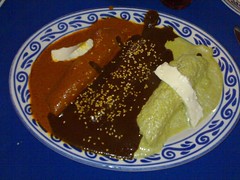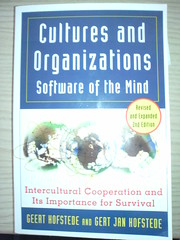
Friday, October 06, 2006
Thursday, October 05, 2006
Language and national character
After reading this book and some other materials for my intercultural management I've been able to slightly refine an old idea I had about how different languages express and modify the characters of the people that use it. Even though I'm not a linguist I think it's relatively accurate for some, for others I might as well get grilled. Comments are more than welcome.
- English: good for business and action-oriented. Also good for fantasising.
- Italian: temperamental.
- French: philosophical.
- Finnish: communicate the largest amount of information in the shortest amount of words possible. Also good for creating words.
- German: precise, pünktlich.
- Portuguese: playful, but at the same time rather melancholic.
- Spanish: baroque, but also depends on the speaker. Spanish speakers use it in a much more direct way than, say, Mexican speakers (because their culture is much more direct).
- Dutch: I'm having my first class today, so maybe I'll be able to tell you something in a year.
Could a Japanese speaker please explain what does no mean?
Cafe Tacuba
One of my favourite bands and arguably one of the most popular in Latin America, Cafe Tacuba was formed in the late 80's in Ciudad Satelite, Naucalpan, Estado de Mexico (a suburb of Mexico City very close to where I grew up). Their music is very eclectic with influences from rock, ska, norteña, hip hop, ballad, metal, tango, ranchera, etc., and cannot be rigidly classified as Rock en Español (it is said that not two of their songs are in the same genre). Even though they sing entirely in Spanish, they also have a loyal anglophone following. In their tours they have filled stadiums and other concert venues around Spanish-speaking Latin America, one of the most notorious was packing over 120,000 people in the Zocalo (main square) of Mexico City. Below you can find examples of their music:
Puntos Cardinales (Cuatro Caminos, 2003)
Other videos available:
Rarotonga (Cafe Tacuba, 1992)
Ingrata (Re, 1994)
El Ciclon, (Re, 1994)
Las Flores (Re, 1994)
Alarmala de Tos (Avalancha de Exitos, 1996)
Chilanga Banda (Avalancha de Exitos, 1996)
Como te Extraño (Avalancha de Exitos, 1996)
Dos Niños (Reves/Yo Soy, 1999)
El Ave (Reves/Yo Soy, 1999)
Dejate Caer (Vale Callampa EP, 2002)
Eres (Cuatro Caminos, 2003)
More information in Wikipedia or at their official site.
Puntos Cardinales (Cuatro Caminos, 2003)
Other videos available:
Rarotonga (Cafe Tacuba, 1992)
Ingrata (Re, 1994)
El Ciclon, (Re, 1994)
Las Flores (Re, 1994)
Alarmala de Tos (Avalancha de Exitos, 1996)
Chilanga Banda (Avalancha de Exitos, 1996)
Como te Extraño (Avalancha de Exitos, 1996)
Dos Niños (Reves/Yo Soy, 1999)
El Ave (Reves/Yo Soy, 1999)
Dejate Caer (Vale Callampa EP, 2002)
Eres (Cuatro Caminos, 2003)
More information in Wikipedia or at their official site.
Labels:
en Español,
in English,
Mexico,
music,
Rock,
Rock en Español
Rock en Español
Taken from Wikipedia:
"Spanish language rock and roll (Spanish: Rock en Español) borrows heavily from American, British, Irish, and Australian rock and roll music and from traditional and popular music of Spanish-speaking cultures (cumbia, ranchera, rumba, tango, etc) and has evolved from a cult-like music movement to a more well established music genre. Today, rock en español includes bands from all over Latin America (with especially strong rock scenes in Mexico and Argentina), France, Spain, and the United States."
During the next few posts I'll try to give an introduction to Rock en Español for the uninitiated.
"Spanish language rock and roll (Spanish: Rock en Español) borrows heavily from American, British, Irish, and Australian rock and roll music and from traditional and popular music of Spanish-speaking cultures (cumbia, ranchera, rumba, tango, etc) and has evolved from a cult-like music movement to a more well established music genre. Today, rock en español includes bands from all over Latin America (with especially strong rock scenes in Mexico and Argentina), France, Spain, and the United States."
During the next few posts I'll try to give an introduction to Rock en Español for the uninitiated.
Labels:
en Español,
in English,
Latin America,
music,
Rock,
Rock en Español
Wednesday, October 04, 2006
How to tell if you're from X
Similar to the post below, I came accross this page before. It's very good, and quite accurate for the countries I know.
Labels:
globalization,
in English,
joke,
languages,
society,
World
You know you've been too long in X when...
A collection of "You know you've been too long somewhere" lists:
- Belgium
- Finland
- Mexico
- Japan
- China
- Switzerland
- United Kingdom
- United Arab Emirates
- Malaysia
- Korea
- South Africa
Recommended book: "Cultures and Organizations: Software of the Mind"
I just finished reading this book for my class of Intercultural Management, and I really liked it. There is only one thing that I don't really understand, and that's the Uncertainty Avoidance Index, because in my experience Latin Americans are much better at handling unknowns and improvising than say, Northern Europeans, but the book says that Uncertainty Avoidance is much higher in Latin countries than it is in Northern Europe. Will have to think about it.
Another thing I realised is that I understand now why I was able to adapt so well to living in Finland (and now Belgium): I was not raised so much as a Mexican. While growing up my home environment was much more conductive to discussion, and my parents always insisted on us being independent. I'm very glad for that.
Tuesday, October 03, 2006
Mexican food abroad
This is a theme that I'll keep on talking about, so bear with me. I was looking for some other information when I saw this article (The taco that ate Sweden). Whereas the situation is something that I definitely encountered before when I lived in Finland, I really feel the urge to educate all those that can read this that hard shell tacos are not Mexican. In fact, as the article says, most Mexican food found outside of North America is as Mexican as I'm Russian, i.e. not very much, and finding restaurants that don't have nachos with cheese in their menu is really hard (there are some honourable exceptions such as La Fonda de la Madrugada in Tokyo or La Panza es Primero in Madrid). As for the ingredients, it's easier just to ask a Mexican where to get them or just bring them over.
Tex-Mex food can be good food, but it's not Mexican!

Tex-Mex food can be good food, but it's not Mexican!

Mexican film directors in Hollywood
I came accross an article depicting the artistic relationship between Alfonso Cuaron, Guillermo del Toro and Alejandro Gonzalez Inarritu, and couldn't help to be a little moved by their self-professed admiration for each other, and the assistance and cross-pollination they've given to each other.
"Babel", "Children of Men" and "Pan's Labrynth" will be released during this fall, and I for one plan to watch them.
"Babel", "Children of Men" and "Pan's Labrynth" will be released during this fall, and I for one plan to watch them.
Monday, October 02, 2006
Subscribe to:
Comments (Atom)






